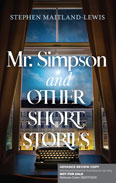
 |
Mr. Simpson and Other Short Stories
by Stephen Maitland-Lewis
Hildebrand Books an imprint of W. Brand Publishing
Spanning the decades between the 1940s and the early 2000s, the twenty-one short stories in Maitland-Lewis' collection share common themes of discontent, deception, despair, greed, lust, hope, ambition, and personal fulfillment. For example, a man's military deployment to Africa drives his lonely fiancée to infidelity in Ohio. An unfaithful wife banishes her husband from his own home, never imagining that her greed and her refusal to let him see his son will give him his first laugh in fifteen years. A researcher in a remote Danish settlement keeps a damaging secret about the true origin of her lover's Nobel Prize-winning literary accomplishment. A supposed former prisoner tattooed at Auschwitz actually received his body art at an Argentinian tattoo parlor twenty years after the war. A young man engages in an affair sanctioned by his paramour's husband. Another escapes prosecution for murder, while the victim's unforgiving mother murders his innocent portrait painter brother for the crime. And in the title story, Ernest Simpson, former husband of Wallis Simpson, publishes a bestselling tell-all book about their post-divorce friendship and her regret at having married the onetime Edward VIII.
The author successfully reveals that human foibles are universal. Some families are destroyed, others newly discovered. Along the way, though, can come small moments of personal triumph. For instance, a publisher wins the lottery just in time to quit the job he hates in the wake of 9/11. A failed concert pianist can at least say that he once played for Louis Armstrong—his greatest achievement until he learns that musical talent has spectacularly visited his family.
Maitland-Lewis is a bestselling author of five novels. However, this is his first short story collection. He has also written a play based on the book's title story. Idle, rich, and wealthy workaholics who practice law, deal in art, or operate banks fill the pages. The use of riches for the good of others is almost nonexistent. Some might say this reflects the use of personal wealth in real life. The author himself was once an attorney and investment banker who has traveled the world, another circumstance that contributes to his masterful craftsmanship of plot and character. His professional background allows him to write realistic fiction about characters who occupy them.
The author's male and female characters are equally susceptible to weakness of character or emotional frailty. However, they also have the equal opportunity to show fortitude and self-restraint. For example, investment banker Alex Butler has a nervous breakdown and requires years of psychiatric treatment after his wife's betrayal. Meanwhile, Thelma Brewster calmly shoots an apparent murderer. Stage actor Max Dawson ignores insults from the man who stole his girlfriend, instead sending him free tickets to a performance. Juliette Monet overlooks the stigma of unwed motherhood in the 1940s and raises her lover's child.
Maitland-Lewis convincingly writes about any era in which he sets his stories, comfortably describing everything from the isolation of a New Zealand sheep farm to the pandemonium of the terrorist attacks on the World Trade Center in New York City. Hero or hedonist, each character searches for meaning in their world. Occasionally, at the end of a tale (as in life), they find it. Like the stories in Hovav Heth's The Lobster’s State of Mind, many of these stories are about complicated romantic relationships. Maitland-Lewis’s work shows the same variety in its subject matter as the compilation Fifty-Two Stories by Anton Chekov. Art enthusiasts, classical and jazz music buffs, lovers of world travel, and those who appreciate the exquisite agony of any creative experience may wish to read this book.
A 2022 Eric Hoffer Book Award Category Finalist